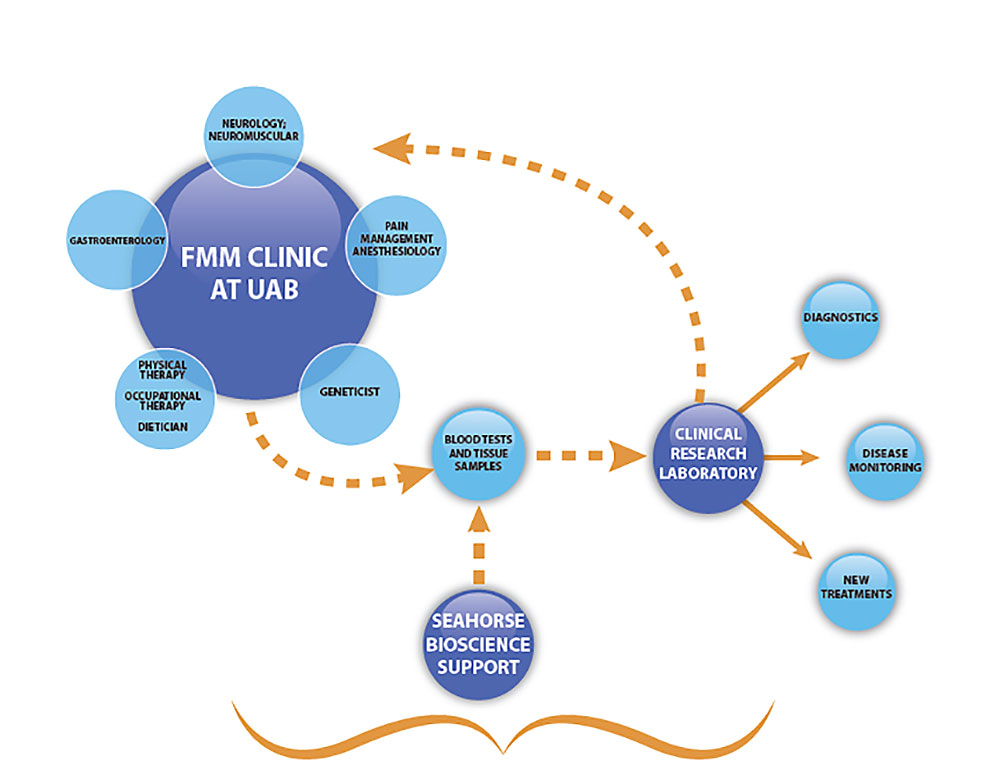 Victor Darley-Usmar, Ph.D.The Foundation for Mitochondrial Medicine, the University of Alabama at Birmingham and Seahorse Bioscience today announced the creation of the Foundation for Mitochondrial Medicine Program at UAB — a comprehensive clinical program for the diagnosis of neuromuscular mitochondrial diseases using precision medicine models for monitoring therapeutic interventions.
Victor Darley-Usmar, Ph.D.The Foundation for Mitochondrial Medicine, the University of Alabama at Birmingham and Seahorse Bioscience today announced the creation of the Foundation for Mitochondrial Medicine Program at UAB — a comprehensive clinical program for the diagnosis of neuromuscular mitochondrial diseases using precision medicine models for monitoring therapeutic interventions.The shared academic, philanthropic and medical mission of the clinic is to revolutionize the treatment and diagnosis of mitochondrial diseases by establishing and integrating state-of-the-art techniques in bioenergetics and therapeutics using a precision medicine approach. The clinic plans to realize this vision by developing two parallel components: 1) a monthly multidisciplinary clinic to evaluate and care for adults and pediatric patients with mitochondrial disease and 2) a reference laboratory for metabolic bioenergetics focused on establishing mitochondrial-targeted clinical, noninvasive laboratory measurements and instruments.
“By establishing the clinic and sharing this vision, we plan to address the unmet clinical, diagnostic and therapeutic needs of the mitochondrial patient community,” said Laura Stanley, Executive Director of FMM. “Clinical needs of the patient community will be coordinated under one roof, and multiple specialists will join together to serve complex patient populations whose symptoms require the collective knowledge of neurologists, geneticists, gastroenterologists and others. UAB and Seahorse Bioscience have made revolutionary advancements in the field of bioenergetics, and UAB’s established research expertise and longstanding work in neuromuscular diseases make it the ideal location for the program.”
Mitochondrial disease can be caused by genetics and mutations to the mitochondrial or chromosomal DNA or can be acquired due to metabolic, aging or environmental stress. Despite significant advances in recognizing, diagnosing and treating patients over the last 40 years, there are still lacks of effective treatments that are targeted to the specific deficit in a patient. The precision instrumentation developed by Seahorse Bioscience and the bioenergetics testing from UAB will allow advances in metabolic and genetic analysis to be applied to the diagnosis and treatment of patients with mitochondrial disorders. Mitochondrial dysfunction is an underlying cause of many neurodegenerative diseases, cancer and cardiometabolic syndromes. From Parkinson’s to Alzheimer’s, diabetes and beyond, an understanding of mitochondrial stresses can lead to better treatments and quality of life for many.
 Click to enlargeUAB has a tradition of excellence in research and participation in clinical trials. UAB is also uniquely placed to advance the field of diagnostics, biomanufacturing systems and consumable labware products for biological research. Scientific expertise in mitochondrial medicine is longstanding at UAB and is available through a network of departments and the centers, especially the Center for Free Radical Biology. The UAB Mitochondrial Medicine Laboratory was established in 2011 in the Department of Pathology in the School of Medicine, and has been pioneering translational tests to assess mitochondrial function through noninvasive tests in human subjects.
Click to enlargeUAB has a tradition of excellence in research and participation in clinical trials. UAB is also uniquely placed to advance the field of diagnostics, biomanufacturing systems and consumable labware products for biological research. Scientific expertise in mitochondrial medicine is longstanding at UAB and is available through a network of departments and the centers, especially the Center for Free Radical Biology. The UAB Mitochondrial Medicine Laboratory was established in 2011 in the Department of Pathology in the School of Medicine, and has been pioneering translational tests to assess mitochondrial function through noninvasive tests in human subjects.“The most serious diseases that affect developed nations, such as atherosclerosis, neurodegeneration and diabetes, are known to involve changes in bioenergetic health,” said Victor Darley-Usmar, Ph.D., endowed professor of mitochondrial medicine and pathology, vice-chair for research in the UAB Department of Pathology, and scientific director of the program. “The challenge is to translate the findings in basic research in mitochondrial function and the pathology of disease to the clinic, and this program will be a major step toward achieving that aim. For the first time, we will apply new means of measuring bioenergetic health to the management and care of patients with mitochondrial diseases.”
Seahorse Bioscience developed the enabling technology upon which bioenergetics measurements, for the first time, can provide the necessary precision and reliability required to establish Clinical Laboratory Improvement Amendments (CLIA) tests for mitochondrial pathologies. Seahorse is the industry leader in metabolic analyzers and assay kits for measuring cell metabolism in live cells, in real time. XF Technology and stress test kits render the understanding and diagnosis of mitochondrial disease into a simple, efficient and user-friendly process, enabling researchers to understand better how bioenergetics regulates cellular function. Utilizing XF Technology and a bioenergetics stress test, researchers will measure and analyze respiratory complex activities and mitochondrial DNA damage in white blood cells and platelets from blood samples. This information will then form the basis of a Bioenergetic Health Index (BHI). The test is much easier to administer than a diagnostic muscle biopsy, and can effectively monitor the progression and response of patients to treatment. An important objective for the first three years of the UAB Program and Clinic will be to validate and provide CLIA certification for these tests using the XF platform.
“One of the keys to the resurgence in mitochondrial research and treatment has been our ability to redefine metabolism in the context of the complete cellular architecture of a living cell,” stated David Ferrick, chief scientific officer of Seahorse Bioscience. “Making this complexity addressable allows researchers and physicians to ask and answer questions that were out of reach, and thus limited them to theory and speculation. The combination of compelling patient advocacy by the FMM, basic and clinical expertise of UAB, and enabling technology from Seahorse will be the perfect storm for mitochondrial diseases.”